Blending Borders #6
This Fortnightly Newsletter explores ongoing issues and perspectives from India’s neighbouring countries, including - Sri Lanka, Bangladesh, Nepal, Myanmar, Bhutan, Maldives and Afghanistan.
August 24th, 2021
Issue #6
*Note to all my readers - Unfortunately, I am under the weather, so I will be keeping this issue shorter than usual. Apart from the usual vaccine updates, I will be focusing solely on Afghanistan in this issue. I apologize for the limited content today, but I hope you enjoy it as I have been waiting to discuss the Taliban takeover in Afghanistan.
Before I begin, the last date to apply for the Takshashila Institution’s 12 week Public Policy course is on August 28th. If you are interested in any of the following streams:- Public Policy, Health & Life Sciences, Technology & Policy and Defence & Foreign Affairs, click here for details and more information on each specific course. The courses are all online and can be taken from anywhere in the world. There is still time so hurry before it is too late!
In Brief - Vaccine updates, America’s ‘Forever war’ ends in Tragedy - Perspectives on the developing situation in Afghanistan
The Raging Pandemic
According to a local news outlet, Sri Lanka received a batch of 76,000 Pfizer vaccines on the morning of August 23rd. China and Sri Lanka are set to deepen ties of their vaccine diplomacy as a leading Chinese pharma company will be setting up a manufacturing plant in the district of Hambantota. The setting up of the plant will enable Colombo to source about nine million COVID-19 vaccines from the Chinese pharma company in charge, according to Sri Lanka’s ambassador to China - Palitha Kohona. Meanwhile, INS Shakti of the Indian Navy had arrived in Colombo port on August 22nd, bringing 100 tonnes of medical oxygen to Sri Lanka - a show of strength in maritime bilateral relations between the two countries.


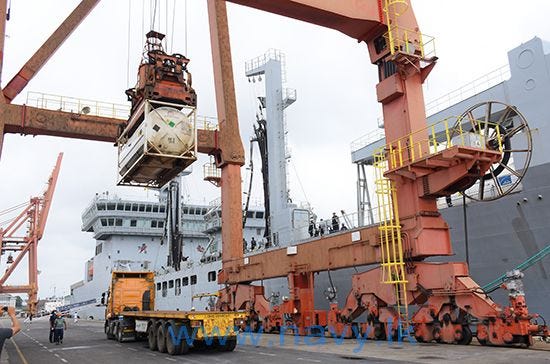

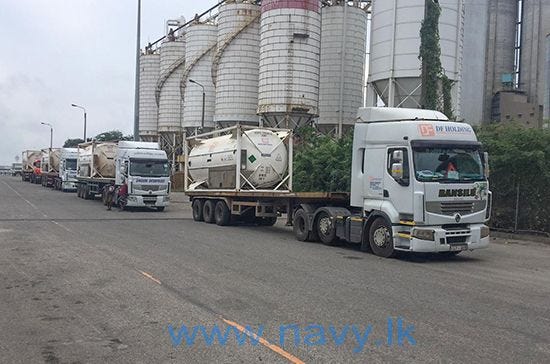
China has signed an MoU with Bangladesh to produce COVID-19 Sinopharm vaccines locally - about 5 million doses monthly. Dhaka also received about 781,440 AstraZeneca vaccines from Japan on August 21st - its fourth consignment from Tokyo. Meanwhile, Bhutan is emerging as a vaccine saviour as it sent about 150,000 vaccine doses to Thailand on August 20th amid an increasing surge in infections and vaccine shortages. The U.S embassy in Georgia also lauded Bhutan’s efforts in immunizing the majority of its population. In a report released by the embassy, the UNICEF Bhutan representative Dr. Will Parks said - “Bhutan’s successful vaccination drive is a powerful example of how the donations of vaccines, secured bilaterally and multilaterally, can help protect and save lives.’’
Finally, a local media report in Myanmar revealed that the military undertook a secret vaccination program on soldiers by inoculating them with India’s Covaxin without informing them that it had been approved. The program took place over three months, starting in January. Many of the officers said they felt like they were being used as “guinea pigs” or “lab rats”. They also revealed that the program was expanded to include more military personnel per senior officers' orders.
The Debacle in Afghanistan
The Council on Foreign Relations (CFR) created an incredible timeline of the U.S war in Afghanistan from 1999 to 2021. It documents every major historic event of America’s security policy in the region up until the present day, noting the U.S withdrawal and Taliban takeover. It is definitely worth checking out to gain an overall understanding of U.S actions in Afghanistan and it is easily summarized. Check it out here - A timeline of the U.S war in Afghanistan (1999-2021).
In a latest commentary for War on the Rocks, Kabir Taneja and Mohammed Sinan Siyech assess the threat of terrorism in South Asia after the fall of Afghanistan to Taliban rule. I will highlight here some of the important points and arguments mentioned in the article but do have a look at the whole piece. The defining argument made in the piece is that the threat to South Asian countries as a result of the withdrawal of U.S troops, collapse of the Afghan military and control of the Taliban, is a matter of concern - particularly for India. Anti-India terror groups like Lashkar-e-Taiba and Jaish-e-Mohammed could potentially set up bases in Afghanistan to conduct attacks into Kashmir. On the other hand, the Al-Qaeda network and its bases could also benefit from the victory of Taliban and locate its fighters in various parts of the Indian subcontinent. A growing relationship between the two terrorist networks could be a challenge for U.S counter-terrorism efforts in South Asia as a whole. The existence of other groups across smaller countries like Sri Lanka, Maldives, Bangladesh and Myanmar is also alarming. Regarding the future of Jihadism in a post-American Afghanistan, the authors conclude with four important points:
First, the Taliban’s perceived victory over the United States will likely inspire jihadist groups.
Second, Afghanistan will almost certainly become an attractive destination for South Asian extremists (and jihadists from other parts of the world) once again.
Third, foreign fighters will gain experience in Afghanistan and will eventually go back to their home countries, bringing that experience with them.
Fourth, the Taliban’s advances have already given it access to major resources and weapons. The Taliban might funnel these to other groups.
How will China benefit from a Taliban takeover?
Brookings Institution published a blog by Ryan Hass that includes the authors observations on China’s take on Afghanistan, based on over a decade of discussions with Chinese officials and experts on the Afghan question. The first and foremost question is whether China is likely to exploit the situation in Afghanistan post U.S withdrawal.
Answer: “Beijing is a master only of its own interests in Afghanistan”. China is primarily concerned with its security interests in the region - specifically the possible spillover of Islamist extremism into China.
“China will not allow principle to stand in the way of pragmatism”. This was evident in the recent hosting of Taliban leader Mullah Abdul Ghani Baradar by Chinese FM Wang Yi in Tianjin. Beijing has understood that it must find ways to encourage the Taliban to cater to Chinese interests and in doing so deny safehaven to Uyghur militants.
China has been patient in investing too much in Afghanistan. Over time, it will definitely benefit from Kabul’s rich mineral resources. But increased economic investment in the region will not be done unless its security requirements are met.
The Second question is concerned with how China will respond to America’s withdrawal.
Answer: “Efforts to advance a narrative of American decline.” The Chinese are likely to exploit the situation by spreading the narrative that America is incompetent and unreliable. It will target two main audiences: the domestic one and the international one. The underlying message to both would be that America’s failed efforts in Afghanistan proves it is on a path of decline.
The last and final question the author addresses is the threat to Taiwan.
Answer: “Taiwan is not Afghanistan”. The threat to Taiwan is likely the same now as it was a week ago. Taiwan is a democratic society and a partner and friend to the United States and other countries in the region like Japan and Australia. China is likely to spread the same narrative on America’s incompetence and unreliability and try to persuade the Taiwanese people that the only way to peace is through Beijing. China is very much likely to use the events in Afghanistan to push forward their own narrative.

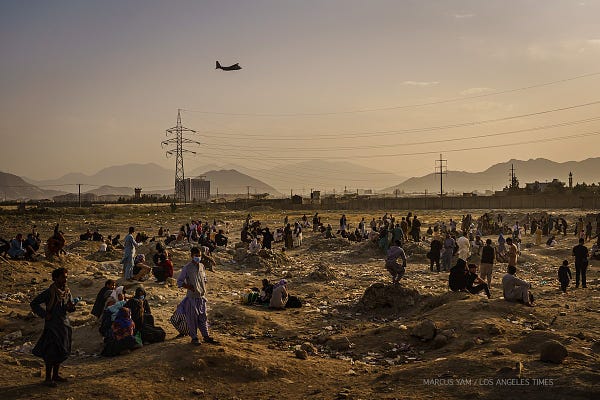
Meanwhile, Look at this beautiful photo by Los Angeles Times Photojournalist and Foreign correspondent Marcus Yam. It captures the plight of innocent Afghan’s waiting to seek refuge amidst the dusky war-torn skies of Kabul.
An article in NPR - a non-profit media organisation based in Washington D.C mentions four Reasons why a Taliban takeover in Afghanistan matters to the world.
Afghanistan will become a human rights problem
A Taliban regime could become a safe haven for extremists
A Taliban-ruled Afghanistan might destabilize Pakistan - *A big threat for India*
China could increase its foothold in the region.
Other Stories
Afghanistan’s banking system is in a state of collapse and people throughout the country are running out of money.
Sri Lankan Foreign Ministry issues a statement on the situation in Afghanistan. The government is deeply concerned about the situation in Afghanistan and is closely monitoring developments.
Concerns over China’s inroads in Bangladesh - Bangladesh now is a geostrategic force to be reckoned with, but India may be dropping the ball.
Singapore says ASEAN is not as effective as hoped in Myanmar. The United Nations and many countries have urged ASEAN, whose 10 members include Myanmar, to restore stability through diplomacy.
Tajikistan reportedly funnelled arms to anti-Taliban resistance forces in Afghanistan
Iran resumes export of oil and gas to Afghanistan after talks with Iranian officials.
China’s Foreign Minister Wang Yi talks with ASEAN new envoy Erywan Yusof and makes five suggestions on Myanmar.
Suggested Reads
Collapse in Afghanistan: Early Insights from RAND Researchers - Q&A - RAND Corporation
A US not tied in Afghanistan only helps India deal with the Pakistan problem better - Rajesh Rajagopalan - The Print
Bangabandhu’s foreign policy legacy - Tariq Karim - The Daily Star
The new Quad that India needs to worry about - Rajeev Agarwal - TOI
The Afghanistan occupation and the Japan occupation - We learned the wrong lessons from our post WW2 success - Noah Smith - Substack *Must Read*
Trivia for the Day

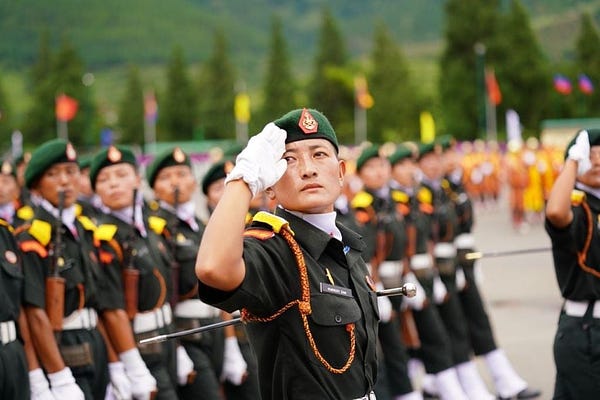
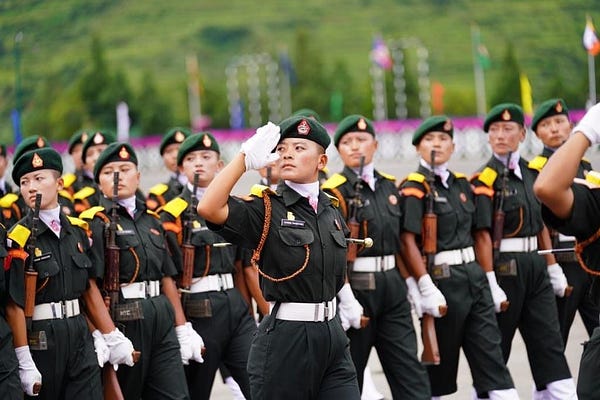
The Sharia law is a religious law forming part of the Islamic tradition. It is derived from the religious precepts of Islam, particularly the Quran and the hadith. The manner of its application in modern times has been a subject of dispute between Muslim fundamentalists and modernists. Here is a list of countries that have adopted the controversial law for years:
Afghanistan
Saudi Arabia
Brunei
Iran
Pakistan
Indonesia
Finally, watch this BBC interview with Taliban spokesperson Suhail Shaheen regarding the issue of foreign military withdrawal from Afghanistan by August 31st. “There will be consequences if there are delays” he says.

Thats it for today. I hope you enjoyed this issue!
Thank you for subscribing to this newsletter. If you found it interesting, please share it with friends, colleagues and family.
This Newsletter is written by Ameera Rao, a Research Assistant at the Takshashila Institution. She has previously completed a BA (Hons) in International Relations from King’s College London.



